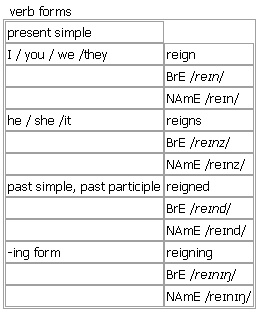 reign
reign

reign [reign reigns reigned reigning] noun, verb BrE [reɪn] NAmE [reɪn]
noun
1. the period during which a king, queen, ↑emperor, etc. rules
•in/during the reign of Charles II
2. the period during which sb is in charge of an organization, a team, etc
•Sir Matt Busby's reign at Manchester United
Word Origin:
Middle English: from Old French reignier ‘to reign’, reigne ‘kingdom’, from Latin regnum, related to rex, reg- ‘king’.
Example Bank:
•By the end of his reign, the vast empire was in decline.
•He was a player during Sir Matt Busby's reign at Manchester United.
•The house was built during the reign of Henry VIII.
•The story only came out during the final days of his reign as Chief Executive.
verb
1. intransitive to rule as king, queen, ↑emperor, etc
•the reigning monarch
•Queen Victoria reigned from 1837 to 1901.
•~ over sb/sth Herod reigned over Palestine at that time.
2. intransitive ~ (over sb/sth) to be the best or most important in a particular situation or area of skill
•the reigning champion
•In the field of classical music, he still reigns supreme.
3. intransitive (literary) (of an idea, a feeling or an atmosphere)to be the most obvious feature of a place or moment
•At last silence reigned (= there was complete silence).
•For a while, chaos and confusion reigned.
Verb forms: 
Word Origin:
Middle English: from Old French reignier ‘to reign’, reigne ‘kingdom’, from Latin regnum, related to rex, reg- ‘king’.
Example Bank:
•a show in which the music reigns supreme
•It was the first visit by a British reigning monarch to Russia.
•A handful of families have reigned over Bangkok's economy for many years.
•In the field of classical music, he still reigns supreme.
•She will face the reigning champion in her first round match.
|
|
